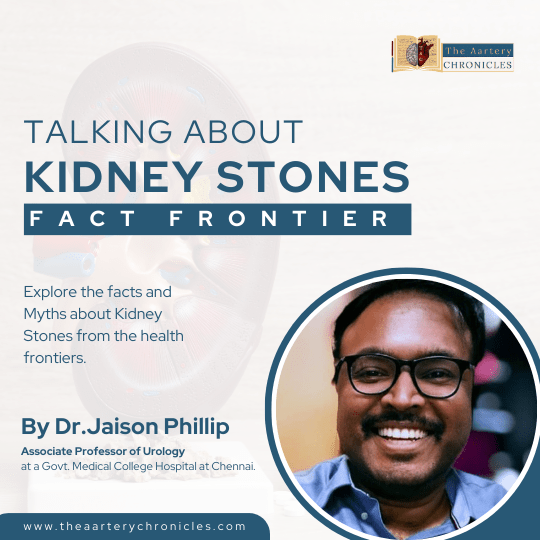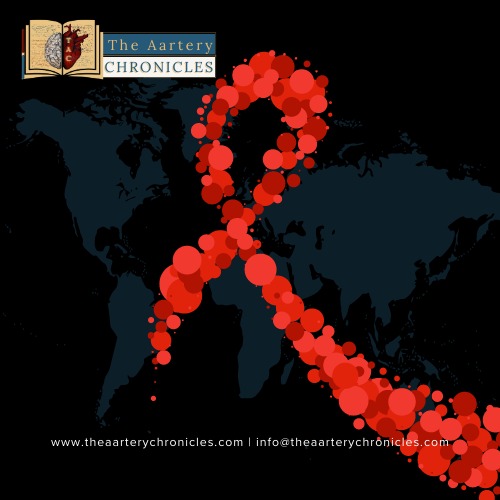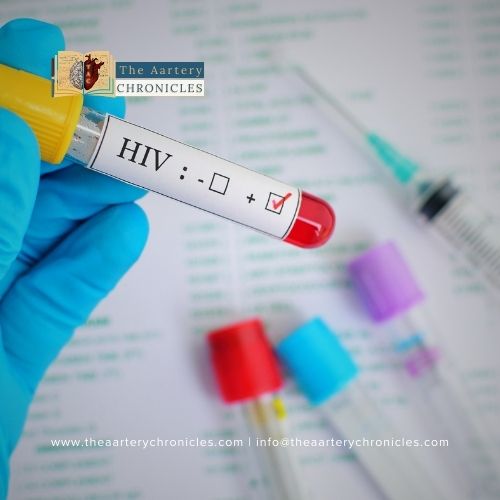

Rethinking Renal Health: Dr. Jaison Philip Dispels Common Myths About Kidney Stones
Kidney stones, also known as nephrolithiasis or renal calculi, are small, hard mineral deposits that form in the kidneys. These stones can cause immense pain and discomfort as they travel through the urinary tract. The symptoms of kidney stones vary depending on their size and location within the urinary tract.
Over the past four decades, there has been a notable increase in the incidence of kidney stones, indicating a rising prevalence worldwide in both developed and developing countries. While exact prevalence figures vary by region, studies suggest that roughly one out of every ten individuals will encounter kidney stones in their lifetime.
The Aartery Chronicles reached out to esteemed Urology specialist Dr. Jason Philip, an Associate Professor of Urology at Government Medical College Hospital in Chennai, to discuss the growing prevalence of kidney stones, particularly among younger age groups. In this article, Dr. Philip delves into some common myths and misconceptions surrounding kidney stones, which frequently lead to confusion and unwarranted anxiety among people. He stressed the significance of debunking these myths to enhance accurate understanding and improve the management of this condition.
Common Myths and Misconceptions Surrounding Kidney Stones
1. Myth: Kidney stones are more prevalent in men.
Fact: In the past, there used to be a slight difference in the occurrence of kidney stones between males and females, with a ratio of around 1.3 males to 1 female. However, over the last three decades, this gender disparity has diminished significantly. Recent data collected globally, spanning various continents, including India, indicates that the incidence of kidney stones has become equal between males and females. As a result, nowadays there is an equal likelihood of females developing kidney stones as there is for males.
2. Myth: Drinking an excessive amount of water can prevent all forms of kidney stones.
Fact: Essentially, while drinking adequate water can decrease the likelihood of developing kidney stones, it doesn’t guarantee complete prevention. Factors such as genetic predisposition, high-salt diets, obesity, excessive vitamin C intake, and consumption of oxalate-rich foods can still increase susceptibility to kidney stones, even with adequate hydration. Moreover, there are cases where kidney stones develop in individuals at a young age without identifiable causes. Therefore, while maintaining hydration is advantageous, it does not entirely eradicate the possibility of kidney stone development, particularly in the presence of other risk factors.
3. Myth: Kidney stones occur only once during an individual's lifetime.
Fact: In the field of urology, there’s a well-known saying: “Once a stone former, always a stone former.” This implies that after experiencing a kidney stone, there’s a 50% chance of recurrence. Despite any subsequent efforts, the risk of developing kidney stones again remains at 50%. Kidney stones are not a one-time occurrence; therefore, individuals should prevent the initial incident.
4. Myth: Kidney stones predominantly affect older adults.
Fact: Kidney stones can develop at any age, irrespective of whether an individual is young, middle-aged, or elderly.
Dr. Philip noted incidences of kidney stones in teenagers and children as young as 2 to 12 years old. Furthermore, he elucidated that kidney stones are more common in the white Caucasian population compared to Hispanics, Indians, and Black Americans. This emphasises that kidney stones can occur in people of any age group and gender without being limited to a specific demographic.
5. Myth: Consumption of oxidised or carbonated drinks can contribute to the formation of kidney stones.
Fact: Research findings have not established a direct link between consumption of carbonated and oxidised beverages and the development of kidney stones. While research studies on this topic are currently underway, as of now, there is no conclusive evidence in the medical literature to substantiate this theory.
6. Myth: Consumption of cranberry juice helps prevent kidney stones.
Fact: While cranberry juice is commonly used to treat urinary tract infections (UTIs), it is not typically effective for kidney stones. But citrate, which is present in many juices, is a potent inhibitor of stone formation. In USA, cranberry juice is often the first-line treatment for UTIs. However, any juice containing citrate can be advantageous for preventing kidney stones or impeding their growth. Orange juice, in particular, boasts high levels of citrate. Thus, consuming any juice rich in citrate content can aid in kidney stone prevention and decelerate their advancement.
7. Myth: Certain plants, fruits, and vegetables are believed to prevent the formation of kidney stones.
Fact: Some specific plants, fruits, and vegetables, such as walnuts, are thought to prevent kidney stones, but these assertions are regarded as myths.
5 Tips by Dr. Jaison Philip for the prevention of Kidney Stones
Dr. Jaison Philip provided insights into scientifically proven strategies and tips for decreasing the risk of kidney stones, which include:
- Ensuring adequate water intake
- Moderating sugar and salt consumption
- Engaging in regular exercise
- Maintaining a healthy weight
- Avoiding excessive animal protein and unhealthy dietary habits
Dr. Philip concluded that despite attempts to educate and debunk these myths, superstitions continue to prevail in society, with individuals often selecting what aligns with their beliefs. He emphasized the necessity of distinguishing between factual information and misconceptions about kidney stones to successfully prevent and manage the condition. By debunking misconceptions and promoting evidence-based information, individuals can take proactive steps to reduce their risk of kidney stones and improve their overall urinary tract health.

Contributors: Dr. Jaison Philip
Dr. Anjali Singh
Priya Bairagi
- Medicine
- Nutrition And Diet












